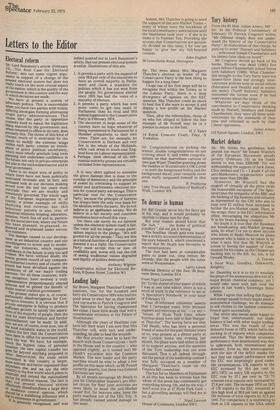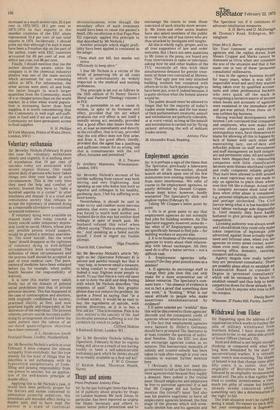Market debate
Sir: 'Me thinks the gentleman doth protest too much!' Mr Ernest Wistrich of the European Movement pleads poverty (February 15) as his funds shrink to less than £200,000. Yet not withstanding the support of Jack Jones, Clive Jenkins and Co — I doubt if all the anti-Marketeers organisations could raise more than £20,000.
Moreover, Mr Wistrich has the support of virtually all the press (with the honourable exception of The Spectator) plus the sympathy of the BBC and the backing of big business and industry as represented by the CBI who aim to raise over £1 million from members to further the pro-Market cause. Then, in the wings, there is the EEC information office, encouraging the ubiquitous Mr W in his 'brain washing' crusade.
No doubt it is true that the Russians are broadcasting anti-Market propaganda. So what! I've yet to meet anyone who listens to Radio Moscow let alone someone who is liable to be taken in by what it says. Not that Mr Wistrich is averse to having the support of Communists for his cause, as the Chinese are backing him to the hilt. So, too, is Sir
Oswald Mosley. L. Travers
4 Noor Way, Goodley, Oakworth,
Kire: Daunting S as it is to try to emulate
the prose of the anonymous director of a major British chemical company, yet I would take issue with him over his article in last week's Sovereign State column. li I agree that selling fish fingers and orange squash to Italy might seem a monumental challenge, we do manage. to sell clothes to the fashion conscious French quite successfully.
Our writer also seems quite happy to forget that, unfortunately, our trade balance is bad with other major trading areas. This was the result of our domestic boom in 1973, which led to the , sucking in of imports while companies restocked. That the British economic performance then deteriorated was due to upheavals, both international and domestic. Even so, this preoccupation with the size of the deficit masks the fact that our export performance with the EEC was surprisingly good under the circumstances. UK exports to the EEC increased by 10.4 per cent in 1971/1972; on entry UK exports to the EEC rose by 37.1 per cent in '72 / '73 whereas total exports only increased by 27.8 per cent. The increase 1974 on 1973 of UK exports to the EEC remained at this high level at 36.6 per cent as against the increase of total exports by 32.5 per cent. For comparison it is interesting to look at UK exports to the USA which increased at a much slower rate, 25.4 per cent in 1972/1973, 16.1 per cent in 1973/1974. In fact exports to the member countries of the EEC alone represented 33.4 per cent of our total exports in 1974. Incidentally, I should point out that although I'm sure it must have been a Freudian slip on the part of the author, trade with EEC countries accounted for 69 per cent of non oil deficit last year, not 96 per cent.
Finally, I should mention that (as the author should be. aware, since his company is in the chemical industry) plastics was one of the main sectors which accounted for our worsening deficit in 1974. For information, the other sectors were steel, oil and food, the latter bought in much larger quantities from the Community, much of it at cheaper prices than on the world market. In a time when world population is increasing faster than food supplies, it is worth remembering that the Community is well nigh self-sufficient in food and if we are part of that Community we have permanent access to food supplies.
N. H. Phillips 83 York Mansion, Prince of Wales Drive, London, SW11



































 Previous page
Previous page